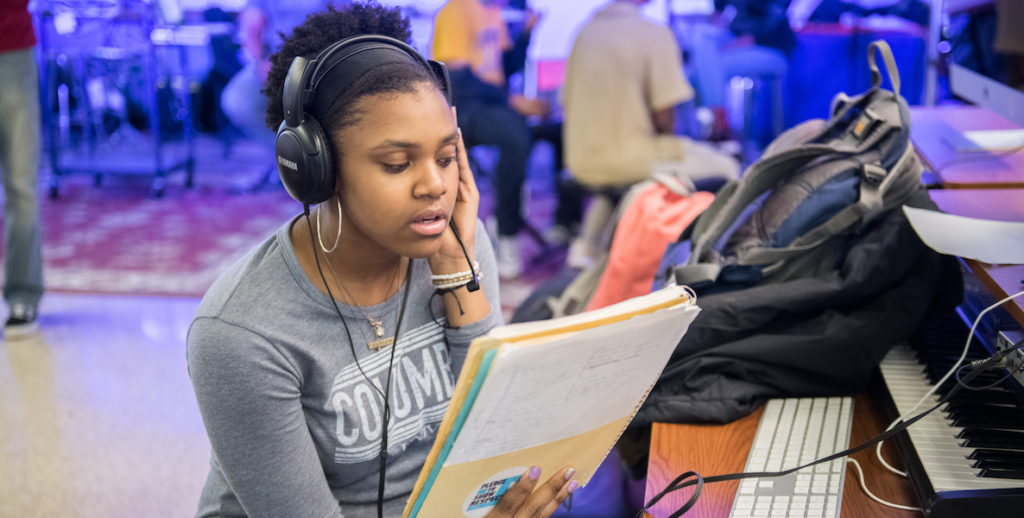When Kenneth Gamble and Leon Huff produced the album “Wake Up Everybody” on the Philadelphia International Records label in 1975, could they—or anyone—have known just how prescient the title track’s lyrics would turn out to be?
Wake up everybody no more sleepin’ in bed
No more backward thinkin’ time for thinkin’ ahead
The world has changed so very much
From what it used to be
There is so much hatred war an’ poverty […]
The world won’t get no better if we just let it be
The world won’t get no better we gotta change it yeah, just you and me
That and other deep questions helped drive the production of a new take on “Wake Up Everybody”: a soulful, soaring, 21-track album of original songs (and a cover of the album’s title track) created by the students of Hill-Freedman World Academy in North Philly and released for free last month by the school’s student-driven record label, Hill-Freedman Records.
The album isn’t just a feel-good school project: It’s legitimately good music—lyrically complex, instrumentally nuanced […] exploring love, relationships, and social justice.
This is the third album from Hill-Freedman; each has been spearheaded by the school’s talented and tireless music technology teacher, Ezechial Thurman, in partnership with LiveConnections, the music nonprofit that, since 2008, has been bringing free music education to Philly kids (and other oft-overlooked communities, like refugees and people with disabilities).
Thurman is a classically-trained, award-winning musician who built the school’s state-of-the-art recording studio by hand, stretching every penny of his budget to provide his students with a first-rate experience. “I always try to look at the kids as my own and say if it’s not world-class, let’s keep pushing and find something that is, because this is what they deserve,” he says. His LiveConnections teaching artists this year included gospel-jazz keyboardist Luke Carlos O’Reilly, Grammy-nominated songwriter Kristal Oliver, and pop-rock singer-songwriter Andrew Lipke, as well as LiveConnections founding director David Bradley.
“These are great musicians, working professionally, who really see [working with students] as part of their artistry,” says Bradley. “That’s a real gift to LiveConnections, and really important to have students experiencing them not just as adults in the front of the classroom, but as collaborators.” It’s having these professionals present throughout the year, and not just dropping in once or twice, that instills in the students a sense of ownership, pride, and confidence, says Thurman.
The resulting album isn’t just a feel-good school project: It’s legitimately good music—lyrically complex, instrumentally nuanced. On track five, “Ruby,” rising junior Adorah Jones gives Sara Bareilles a run for her money. “Forgive you,” track nine by rising junior Ebony Edwards, is heartbreaking in its vulnerability, and breathtaking Alicia Keys undertones. Track three, “Girl Power,” is an uplifting anthem for a generation of young women, and men, who value female solidarity.
The album explores love, relationships, social justice, and more, and features spirited guests. The cover of “Wake Up Everybody” has vocals by school superintendent William Hite, who sings the line “Wake up all the teachers, time to teach a new way,” as well as rapper Chill Moody and jazz singer Laurin Talese. Eric Westbrook, the new director of The Mayor’s Office of Black Male Engagement, has a guest spot as well.
Thurman explains that using the Philly International sound as a north star helped infuse the album with structure, and meaning.
“We could talk about ‘message music,’ which is a term that was coined by Philly International and Gamble and Huff, and talk about what that means. And that way, [the adults] aren’t enforcing the boundaries on the kids, we’re just saying ‘Hey, let’s at least have some really intelligent conversations about choices that others have made,’” he says.
The cover of “Wake Up Everybody” has vocals by school superintendent William Hite, who sings the line “Wake up all the teachers, time to teach a new way,” as well as rapper Chill Moody and jazz singer Laurin Talese. Eric Westbrook, the new director of The Mayor’s Office of Black Male Engagement has a guest spot as well.
One of the things that really resonated with students, Thurman explains, is that Philly International became the second-most successful African American-owned record label in the country behind Motown. “Financial success definitely gets their attention,” he says. “So we can say, ‘Let’s talk about how this was a very commercially successful entity, and they made these choices with their message and their music and their creativity, and let’s draw some inspiration from that.’”
With this approach, Thurman says, he, Bradley, and the teaching artists were able to be stewards and mentors, and not “taskmaster teachers who say you can’t write about that!”
“We put in months and months of time dissecting songs and listening and understanding and making connections to the Philly International sound, and I think that helped students connect,” Thurman says. “This is their grandparents’ or their great-grandparents’ music, not their own, but the cultural relevance for a student body that’s about 97 percent African American definitely matters.”
The concept of connections—to the music, to their peers, and to the world we live in—was a meaningful thread throughout the entire process.
“I love what Camya Bradley in the song ‘All Over The World’ [track two] talks about,” says Bradley. “That we have different languages, we might have different backgrounds, but music can unite us.”
Jaelynn Pearson, a 16-year-old rising junior at Hill-Freedman, says that working on the album boosted her confidence. “It was so surreal. Being with the mic, and being with Miss Krystal [Oliver]; she is amazing. Everything she’s able to do. I was just looking at her like ‘what if I could learn that and do what she’s doing?’” says Pearson, who sings in a choir, plays saxophone, violin, and guitar, and hopes to someday attend Juilliard or another performing arts school.
“I’m pretty nervous around certain people, but with music I can open up. It’s a way for us to express ourselves when we feel like we can’t.”

